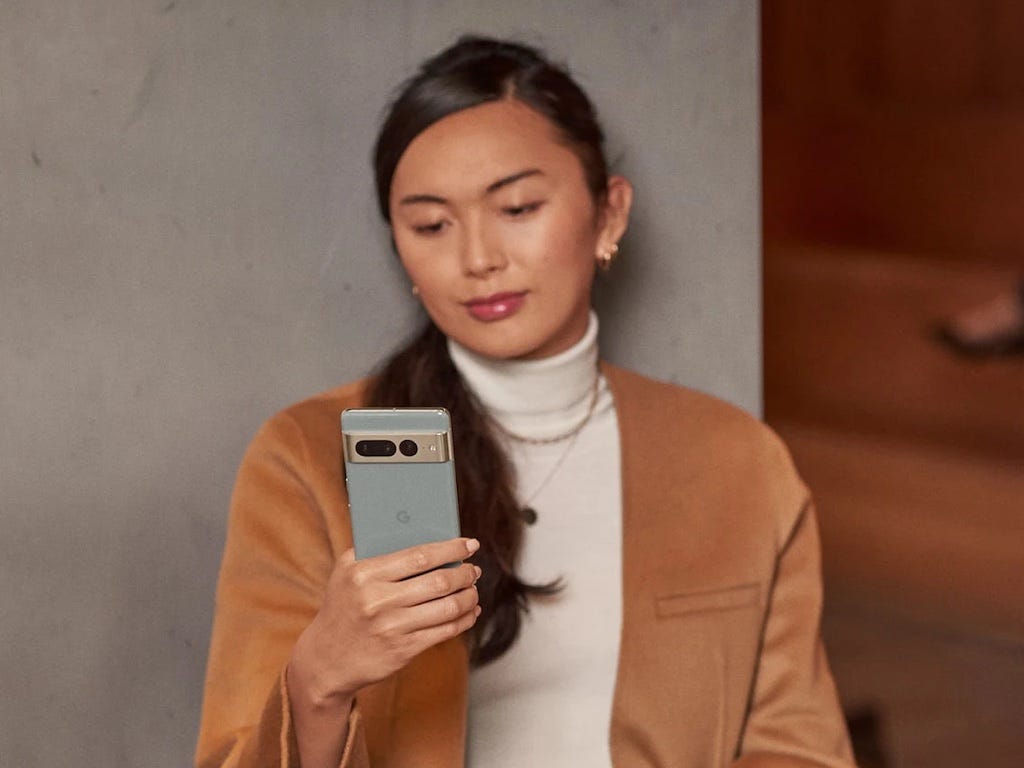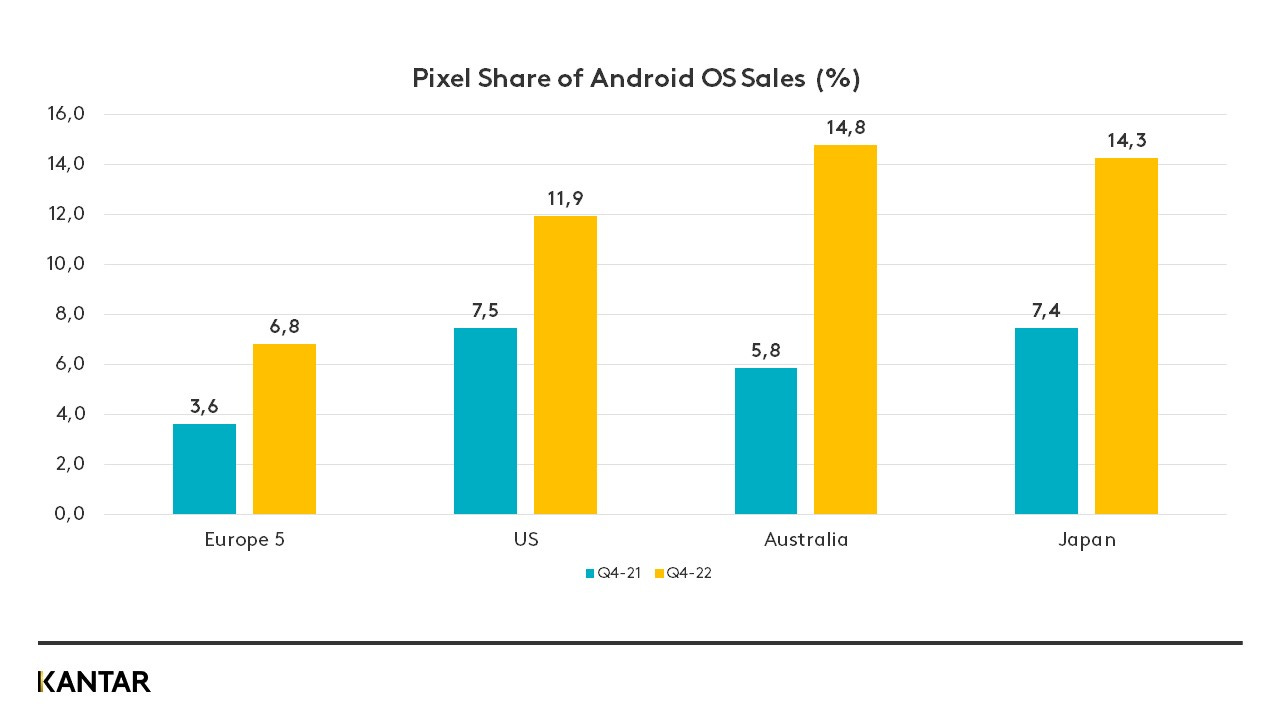Why does Google make phones?
The Pixel is improving but yet to hit it big
Welcome back to Multicore for Thursday, March 16th.
Today we'll be talking about Google's Pixel phones, since seemingly the entire 2023 release schedule found its way onto the internet this week. The Pixel series is notorious for leaking well ahead of its launch, and this does look like a well-rounded lineup, from the entry-level 7a to the flagship 8 Pro and a long-rumoured foldable phone. The bigger question, as ever, is exactly what Google hopes these phones to achieve.
I don't know how many people bought a phone last month off the back of Google's entertaining "Fixed on Pixel" Super Bowl commercial, featuring Melissa McCarthy and Giannis Antetokoumpo, but the number can't have been zero. I'm wondering how those people felt a couple weeks after it aired, when Google made the commercial's Magic Eraser photo editing feature available for subscribers to the Google One cloud storage service — including iPhone users.
On one level, it's an obvious move. Google didn't become a trillion-dollar company by locking services to its own products, and monetising its most engaged Photos users makes sense. But what doesn't make sense through that lens is marketing the Pixel as a device with exclusive features. And, since these features can be accessed on any Android phone or iPhone using Google's apps or services, why does Google need to make the phones in the first place?
“It’s a good question. I have answered it before, but I think it’s worth saying. If you’re committed to driving computing forward, I do think you need to think at the intersection of software services [and] hardware, to evolve it. I think we have a unique expression of it. We have always invested in certain deep technology to build helpful experiences with AI, we see a chance to express it in a unique way. So I think we will bring newer insights, newer experiences.
Second, it helps us drive the ecosystem forward. In my experience, every time we have done something well in a category, that category as a whole benefits in Android. Be it the Nexus phone or Nexus 7 as a tablet, and so on.
And third, to do this well, you have to build a sustainable business. We are committed to it, we are building a business we want to grow and do well, as well.”
That's CEO Sundar Pichai a year and a half ago, answering a question from The Verge on why Google makes hardware.
The first answer is reasonable. Google's Pixel phones have gone through some bumpy experiments but are generally very good products today, and there have been some legitimate breakthroughs. The first Pixel camera's innovative Smart HDR system set the bar for computational photography and had competitors, including Apple, scrambling to catch up. The same was true of its pioneering Night Sight low-light mode. The Pixel's voice recorder app is fantastic, using machine learning to transcribe conversations in real time and save them in searchable text. This is the kind of thing that Google is arguably better positioned than anyone to research and produce.
The second answer is related but also fair. The Nexus devices served as an example of what Android could be when unadorned by customisations from manufacturers or carriers; the Pixel line is about showing off Google software and services. That first Pixel also saw the debut of the Google Assistant, for example, which Google soon made available to other phone manufacturers.
It wouldn't have made sense to use the Assistant as a way to sell Pixel phones. Ultimately, Google benefits when phones get better and people use them more. That was the original bet with Android, which was launched as a way to gain leverage over what would become the dominant computing paradigm for billions of people. The Assistant is both a differentiating feature and something that further entrenches people within Google's ecosystem of services. The Pixel is a useful vessel to demonstrate this kind of thing at its best.
It's the third answer that's the most questionable. Not only is it in tension with the first two, it hasn't really happened to the point where Google can call itself a major player. Rick Osterloh, Google's hardware chief who joined from Motorola just ahead of the first Pixel launch, said in 2017 that he didn't want the Pixel to be a "niche thing" and hoped to be "selling products in high volume in five years".
Pixel sales are improving, and 2022 was a good year, but it's hard to say that Google has achieved high volumes. Q4 was a "record global sales quarter" for the Pixel line, according to Kantar, which pegged Google's share of Android phone sales as 11.9%, up from 7.5% a year ago. That gives it a single-digit share of the overall market when you factor in the iPhone — Counterpoint puts it at 5% for the quarter, behind Samsung at 20% and Lenovo's Motorola at 6%.
Google doesn't break out Pixel revenue in its earnings, listing it under the same "Google Services" band that includes its core search business and accounted for roughly 90% of revenue last quarter. I can believe that the business is sustainable, but I’m not sure this is what Osterloh was aiming for five years ago.
Pichai did single out the Pixel phones in his most recent earnings call, describing the "Pixel 6A, 7, and 7 Pro as "the best-selling generation of phones we have ever launched" and saying the company is "working to improve the economics and hardware as we focus more intently on the Pixel line".
However, he also said in the same call that "features like Magic Eraser and Photo Unblur are incredible and help differentiate Pixel from others" just a few weeks before Google brought Magic Eraser to the iPhone, which doesn't speak well to the overall strategy. Did he know that was going to happen? Did the people producing the Super Bowl commercial?
The Pixel would undoubtedly be more competitive and sell more units if Google focused on it in a vacuum. Google has demonstrated that it's more than capable of putting together a compelling, original software experience. But it can't — and probably doesn't want to — compete with the brand muscle of Samsung, nor is it ever going to be on the cutting edge of hardware coming out of China. That's because the Pixel needs to be additive to Android, not dominate it. It nudges people in the direction of Google services whether they buy a Pixel or not.
The leaked folding phone, reportedly called the Pixel Fold, will likely be instructive in this regard. Google has been working on native folding display support to Android for several years, and this year's upcoming Android 14 is designed around features like sliding panes and multiple windows. A lot of current foldable phones' functionality is added on top of Android by the manufacturers themselves, but I expect the Pixel Fold will serve as a demonstration of how Google intends these devices to work.
Okay, onto some more news from this week.






